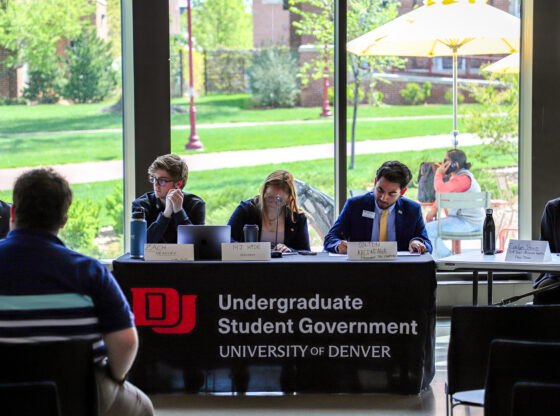On Friday, Feb. 7, world-renowned Chinese expert Orville Schell spoke to around 50 people in Ben Cherrington Hall, addressing the topic “How Will China’s New Wealth and Power Affect Its Foreign Policy?” The speech was part of a continuing series of forums based on China hosted by the Korbel School of International Studies.
Schell is the Arthur Ross Director of the Center on U.S.-China Relations at the Asia Society in New York. He is a former professor and dean at the University of California, Berkeley’s Graduate School of Journalism. Schell was born in New York City, graduated Magna Cum Laude from Harvard University in Far Eastern History, was an exchange student at National Taiwan University in the 1960s and earned a Ph.D. at University of California Berkeley in Chinese History. Schell is also the author of 15 books, 10 of which are about China.
Schell began his talk by detailing how far China has come since the fall of their last dynasty.
“After the Qing dynasty collapsed, China fell into an abyss of darkness and this nose-dive into decline disturbed intellectuals greatly.”
The problem, according to Schell, was that the Chinese had a memory of greatness and because of that, the Chinese people presumed greatness. When China failed to reach their goals, it did not know who to blame.
According to Schell, China began to put itself on a “road to rejuvenation” when it adapted Leninism and a strong one party, one leader state. Part of this rejuvenation was the implementation of a new Chinese Dream. Whilst compared to the American Dream of personal success and “pulling yourself up by your bootstraps,” the Chinese Dream entails “pulling all of China up by its bootstraps together.”
“Ever since China began to experience greater wealth and power, there has been next to no nationalism,” said Schell. “Everyone just keeps working toward a future day of greatness.”
Schell said he believes there will be a number of ideological problems coming out of China in the coming decades for a variety of reasons. The first, he said, is that China has spent the past hundred years trying to restore itself to greatness.
“China’s operating system continuously gets wiped out and replaced with something new, while America, no matter how messy we get, we always have the Judeo-Christian operating system to fall back onto,” said Schell.
Schell said another reason is that history is controlled in China so its citizens do not get the opportunity to learn from their past mistakes and will be doomed to repeat those mistakes in the future.
Schell’s speech lasted for about 35 minutes before he opened the floor for a 20-minute question period. During this time, he expressed doubts that China is ready for democracy and addressed the issue of North Korea.
Schell wrapped up the event by signing copies of his new book, “Wealth and Power: China’s Long March to the 21st Century,” and meeting with some students, faculty and staff from the Asian Studies department.











